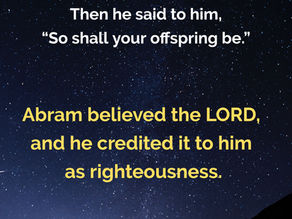Psalm 110 - Victory in Jesus
- Chad Werkhoven
- Mar 14, 2025
- 4 min read
God has promised you victory in Jesus, and He will not change His mind!
Psalm 110
Of David. A psalm.
1 The LORD says to my lord:
“Sit at my right hand
until I make your enemies
a footstool for your feet.”
2 The LORD will extend your mighty scepter from Zion, saying,
“Rule in the midst of your enemies!”
3 Your troops will be willing
on your day of battle.
Arrayed in holy splendor,
your young men will come to you
like dew from the morning’s womb.
4 The LORD has sworn
and will not change his mind:
“You are a priest forever,
in the order of Melchizedek.”
5 The LORD is at your right hand;
he will crush kings on the day of his wrath.
6 He will judge the nations, heaping up the dead
and crushing the rulers of the whole earth.
7 He will drink from a brook along the way,
and so he will lift his head high.
Canons of Dordt
Point 1 - God's Unconditional Election
Articles 1-10
Article 1: God’s Right to Condemn All People
Romans 5:12-14 - Mis-Markmanship
Deuteronomy 28:15-20 - Not A Tame Lion
Luke 15:11-16 - Prodigious Deprivation
Psalm 143 - Aggressive Prayer Pattern
Article 2: The Manifestation of God’s Love
Zephaniah 3:14-17 - The Mighty Warrior Who Saves
Lamentations 3:19-23 - Great Is Thy Faithfulness
Article 3: The Preaching of the Gospel
1 Timothy 2:1-7 - God Our Savior
Rom 10:14-17 - The Power of Preaching
1 Cor 1.23-24 - God's Foolishness
Psalm 93 - Mightier Than Chaos
Article 4: A Twofold Response to the Gospel
John 6:37-40 - Tensegral Theology
John 12:42-50 - Buffet Theology
Article 5: The Sources of Unbelief and of Faith
James 1:13-18 - The Devil (didn't) Make You Do It
Ecclesiastes 7:25-29 - Many Schemes
Ephesians 2:8 - The Gift of God
Psalm 95 - The LORD is OUR God
Article 6: God’s Eternal Decree
Ezekiel 36:24-27 - A Whole New Reality
Romans 9:15-21 - God's Mercy, Not Your Effort
2 Thessalonians 2:10-12 - Love The Truth
Article 7: Election
Ephesians 1:3-6 - Before the Foundation
Deuteronomy 7:1-10 - Set Apart
John 17:1-5 - Sovereign Submission
Psalm 115 - God Does What He Pleases
Article 8: A Single Decree of Election
Romans 4:1-8 - One and the Same
Romans 4:9-17 - Chicken or Egg?
Romans 4:18-25 - Faithfully Face the Facts
Hebrews 11:39-40 - Promises Kept
Psalm 33 - God's Control, Authority & Presence
Article 9: Election Not Based on Foreseen Faith
2 Timothy 1:7-10 - Passive & Powered
Deuteronomy 9:4-6 - You're Not That Awesome
Psalm 91 - The Shelter of the Most High
Article 10: Election Based on God’s Good Pleasure
Luke 2:13-14 - Christmas in March
Galatians 4:1-7 - From Slave to Son
Article 11: Election Is Unchangeable
Just as God is most wise, unchangeable, all-knowing, and almighty,
so the election made by him can neither be suspended nor altered, revoked, or annulled;
neither can God’s chosen ones be cast off, nor their number reduced.
Summary
Psalm 110 could easily be summarized in one word: victory. This Psalm of course portrays victory for the LORD. Notice His sovereign power and how it achieves victory:
I will make your enemies a footstool;
The LORD will extend your scepter;
The LORD has sworn and will not change His mind (of course this is the verse that grabs our attention this week as we remind ourselves of God's immutability!);
The LORD is at your right hand; He will crush kings and judge the nations;
The LORD will lift His head high.
But this week's Psalm also conveys another key theme in the Psalms - a theme which was introduced way back in the second Psalm: that the LORD will share His victory with His anointed King.
It's obvious that Psalm 110 captures a monologue of the LORD. The psalm opens with the phrase The LORD says to my lord... The question is, who is the LORD speaking to? The gospels record Jesus asked this very same question a number of times throughout His ministry (Mt 22:44, Mk 12:36, and Lk 20:42). Jesus notes that David wrote this psalm, yet David certainly wouldn't refer to himself as the LORD (YHWH), but it doesn't make sense that he would refer to himself as my lord either.
So who is the LORD talking to here in Psalm 110?
Dig Deeper
Whereas Jesus only asks the question rhetorically and never fully answers it, Peter, under the inspiration of the Holy Spirit, not only asks the same question about this psalm that Jesus did, but he goes on to answer it in no uncertain terms:
Acts 2:34-39
For David did not ascend to heaven, and yet he said,
“ ‘The Lord said to my Lord:
“Sit at my right hand
until I make your enemies
a footstool for your feet.” ’
“Therefore let all Israel be assured of this: God has made this Jesus, whom you crucified, both Lord and Messiah.”
When the people heard this, they were cut to the heart and said to Peter and the other apostles, “Brothers, what shall we do?”
Peter replied, “Repent and be baptized, every one of you, in the name of Jesus Christ for the forgiveness of your sins. And you will receive the gift of the Holy Spirit. The promise is for you and your children and for all who are far off—for all whom the Lord our God will call.”
ACKNOWLEDGE WHO GOD IS: Our Father, who has sworn and will not change His mind;
ALIGN YOUR LIFE WITH GOD'S WILL: Pray that you will have the confidence in the LORD's victory that Psalm 110 promises;
ASK GOD FOR WHAT YOU NEED:
Read the New Testament in a year! Today: Hebrews 9




















Is the upper case and lower case lettering for LORD or Lord part of the original text.
The references in Mt 22:44, MK 12:36, & Lk 20:42 in the NIV all read “The Lord said to my Lord:”
?